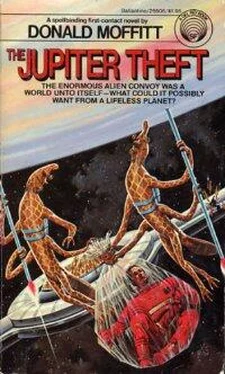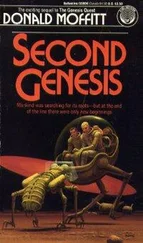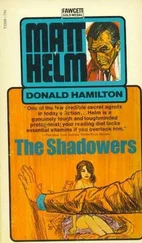“Have a gasp,” Berry said, passing the joint to Gifford. “This is all organic—no synthetic THC added.”
“Thanks,” Gifford said, taking a drag and passing it to Sue. “Too bad about Roy, but his hard luck’s my ticket to Jupiter.”
“Glad to have you aboard,” Jameson said.
“Oh, here’s our other new man,” Sue said. “Hi.”
Jameson looked around and saw Klein standing on the fringes of the group, a plastic-lidded mug in his hand, his eyes roving over the dancers across the way. He turned around and nodded—reluctantly, it seemed to Jameson.
“Hey, you were on Mars,” Gifford said. “Do you know Raul Peterson? Stocky guy. Seismologist assigned to Tharsis.”
“I was at Syrtis Major,” Klein explained. “Excuse me.”
He threaded his way through the crowd and walked in his heavy boots over to the circular bar that skirted the center of the lounge. The two barwomen were both busy, so Klein reached across to help himself. As Jameson watched, Klein thumbed his mug open and started to pour himself a cup of coffee. Just as Jameson was thinking that it was a little odd for Klein to be drinking coffee this early in the party, there was a scream and a little flurry of confusion up at the bar. Klein had managed to spill hot coffee over Beth Oliver, and himself, too. The coffee had streamed right past the rim of the mug and splashed them both. Klein hadn’t allowed for the sidewise curving effect, of the Coriolis force when he poured. It seemed an odd lapse for someone who was supposed to be used to space.
Klein, his sallow face turning livid, was apologizing to Beth, and the United German barmaid was hurrying over with a damp cloth to mop up Beth’s kaleidogown. Jameson craned his neck to see above the heads of the crowd, but then Sue, her voice raised against the din, was saying something to him, and he forgot about Klein.
By the time the intruder from Cygnus crossed the orbit of Neptune, its mass had shrunk to approximately that of the planet Earth. It could be picked up visually now by the 500-inch Sagan reflector on the Moon and the smaller mirror at L-5. With computer-enhancement of the images, its surface features—if you could call them that—could be seen quite plainly.
The Cygnus Object, as the freepie media called it now that its existence no longer could be kept a secret, turned out indeed to be an Earth-size plant, its surface masked by clouds of boiling hydrogen. It even had a moon—a seared, rocky body a couple of thousand miles in diameter—and it also had an inexplicable wobble, as if it were rotating about a common center of gravity with some massive object, one that the telescopes could not detect.
It was going to intersect the plane of the solar system at a shallow angle—about seventeen degrees from the ecliptic—and its speed was now low enough, at some fourteen miles per second, to assure that it would be captured by the Sun.
There was going to be a new planet in the solar system.
There was no hint in any of the stories that the Cygnus Object once had been a dangerous emitter of X-rays whose passage might have wiped Earth clean of life. There was no mention of the fact that it had shrunk from near-Jovian size in a matter of six months. Or that, against all natural law, it had unaccountably slowed to its present sedate speed from a velocity approaching that of light.
Fortunately for the authorities, the wandering planet had been obeying the laws of physics ever since it had come close enough to the solar system for Earthbound observatories and hundreds of amateur astronomers throughout the world to notice it, or its effects.
Independent observers were finding it remarkably difficult to get corroborating data from Farside or the Chinese observatory in the Jules Verne crater—though the Chinese claimed to have discovered the Cygnus Object first. Farside had issued a terse pressfax release just in time to prevent the Greater Japan observatory at Vladivostok from establishing a prior claim, and had said little since. Farside’s new director, Dr. Horace Mackie, was nowhere near as communicative and cooperative as Dr. Ruiz had been, and the man who had succeeded Mackie at the Sagan dome, a young former resident named Kerry, did nothing but spout officialese and academic doubletalk.
The newsies relied mostly on European and Japanese sources. There were enough compulsive talkers with Ph.D.s to give them all the copy and vids they needed about dead planets, torn from their suns, wandering through the void between the stars for millions of years. The story provided a brief circus for the public, and then it began to fade from the news.
Mizz Maybury was the first to notice anything.
She was on duty in the monitoring booth that shift.
For company she had a silent, flat-faced assistant named Sorg, who she knew worked for the NIB. There had been a lot of them ever since Dr. Mackie had become director: extra people, new arrivals from Earth or Mare Imbrium who didn’t seem to be doing anything much, or who, if they did, weren’t very good at their jobs.
“Set up the board for a visual fix on the visitor,” she said, glancing at her worksheet instructions. “I’m supposed to run some spectra tests this shift. You can use the small refractor.”
Sullenly, Sorg moved toward the panel. Maybury shuddered as he passed her. He was a pale young man, short and stocky. She didn’t like the way he kept sneaking glances at her when he thought she wasn’t looking.
Unconsciously her hand strayed to the dollar-sized shaved spot on her skull, where she’d been braindipped. The hair was starting to grow back, and it itched. They had told her that removing the tiny sample of cortical tissue for chemical monitoring during questioning—they took less than a cubic millimeter—couldn’t possibly harm her. She’d hardly felt the prick of the dialytrode needle as it penetrated her scalp. But all the same, she hadn’t felt the same since her arrest. It was more than a little scary to be locked up in a tiny room for a week while those dreadful men shouted at you and asked you questions and made all sorts of terrible accusations just to see how you’d react. They’d even told her that Dr. Ruiz had confessed that she had helped him sell information about the Cygnus Object to the Chinese! She knew that couldn’t be true. And then, when they couldn’t shake her, all the questions about who she’d talked to since the sighting. All of them had been checked out, including her ailing grandmother on Earth. Finally, when they were grudgingly satisfied, all the warnings—threats, really—about not discussing her work with anybody— not even her coworkers at Farside. She hadn’t been allowed her six-month Earth furlough; and even a pass to Mare Imbrium was hardly worth it any more, with the government hassle.
For once, Sorg had managed to talk to the Farside computer without being asked to repeat himself. The photoplastic plate in front of her came to life with the Cygnus Object’s hazy disk. The speck of light off to the side was its moon.
Maybury applied herself to her job. While she was at it, she hooked in the bolometer and took the planet’s temperature.
It was hot, despite its long sojourn in the chilly depths of interstellar space. No walking barefoot on its still-unseen surface unless you wanted to burn your feet! That terrifying blast of X-rays as it plowed its way through the interstellar hydrogen must have warmed it up considerably—and warmed it all the way through. The surface temperature hadn’t dropped by any noticeable fraction of a degree since the last bolometer reading.
She finished her measurements. Another moment and she would have told Sorg to switch off the image. But she just happened to be still looking at the plate when it happened.
Читать дальше












